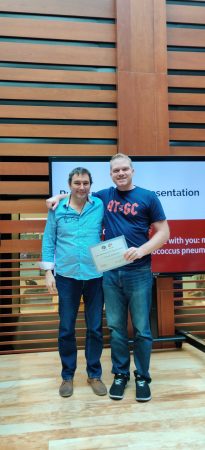Below is a Bluesky thread that summarizes and explains our manuscript. Click here to read it on Bluesky.
New publication alert! “Reassuring humoral and cellular immune responses to SARS-CoV-2 vaccination in participants with systemic sclerosis” Read on to learn why we did this study and why it is important. 1/n https://www.sciencedirect.com/science/article/pii/S0165247824001032?via%3Dihub
Systemic Sclerosis(SSc) is a rare autoimmune disorder that causes fibrosis of the organs. Because it is caused an immune system gone awry, patients and their doctors were concerned that their immune systems might not respond to the vaccine and leave them less protected 2/n
Because SSC is an autoimmune condition, people generally take immunosuppressive drugs, which can also lead to lower vaccine responses and higher risk of infection. We investigated whether antibody or T cell responses to vaccination were affected in SSC. 3/n
Good news! People with SSC made the same amount of antibodies to the receptor binding domain of the Spike protein (i.e, the bit of the virus that the virus uses to get into us) after their second, third, and fourth SARS-CoV-2 vaccinations. 4/n
More good news! T cell responses to vaccines are thought to help with severe disease and may offer some cross-variant protection. Following the second, third, and fourth SARS-CoV-2 vaccinations, participants with SSc had T cell responses = those without SSC. 5/n
For the immunology geeks: People living with SSc have elevated levels of serum cytokines associated with T cell differentiation. Could this change Th1/2/17/reg mix posts vaccination? Nope. 6/n
Caveat#1: This is a small study (because a rare disease) and we couldn’t investigate all the different drugs that people are on. For more info on how drugs affect vaccination responses see our other studies 7/n https://acrjournals.onlinelibrary.wiley.com/doi/full/10.1002/acr2.11697
Caveat #2: This is very much a comparison of the quantity of immune responses, not the quality. There could still be qualitative differences in immune responses that we didn’t catch but… 8/n
…even though there is very little data on whether SSC is associated with higher infection risk or poorer outcomes what little exists doesn’t find a massive difference compared to the general population 9/n https://acrjournals.onlinelibrary.wiley.com/doi/full/10.1002/acr.25226
Take home message #1: Participants with SSc mount similar responses to SARS-CoV-2 vaccination as controls who do not have autoimmune conditions. 10/n
Take home message #2: Many ppl with autoimmune conditions are afraid that vaccination is unsafe for them because they know their immune system is a bit wonky. It is not the disease that affects immune responses, rather it’s some, not all, drugs at some, not all, doses. 11/n
Thanks to emerging leader & 1st author Jenna Benoit (graduating & looking for a job next year – hint), rheumatologist extraordinaire, Dr. Maggie Larche, cellular immunologist Dr. J. Breznik & J Bramson, team Antibody (Nazy, Huynh) & with special thanks to…..12/n
….our participants. People with SSC often have skin changes which makes blood draws especially hard. Thank you for your commitment to our study and huge props to our exceptional phlebotomist/RC Braeden Cowbrough – our unsung hero. 13/n Fin.



